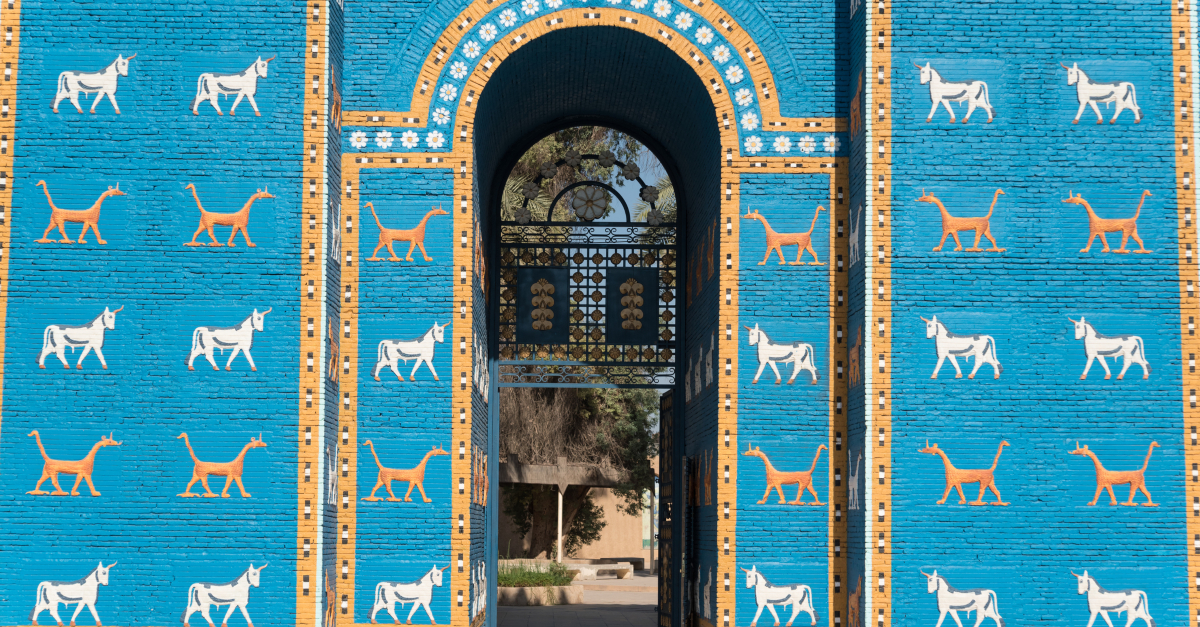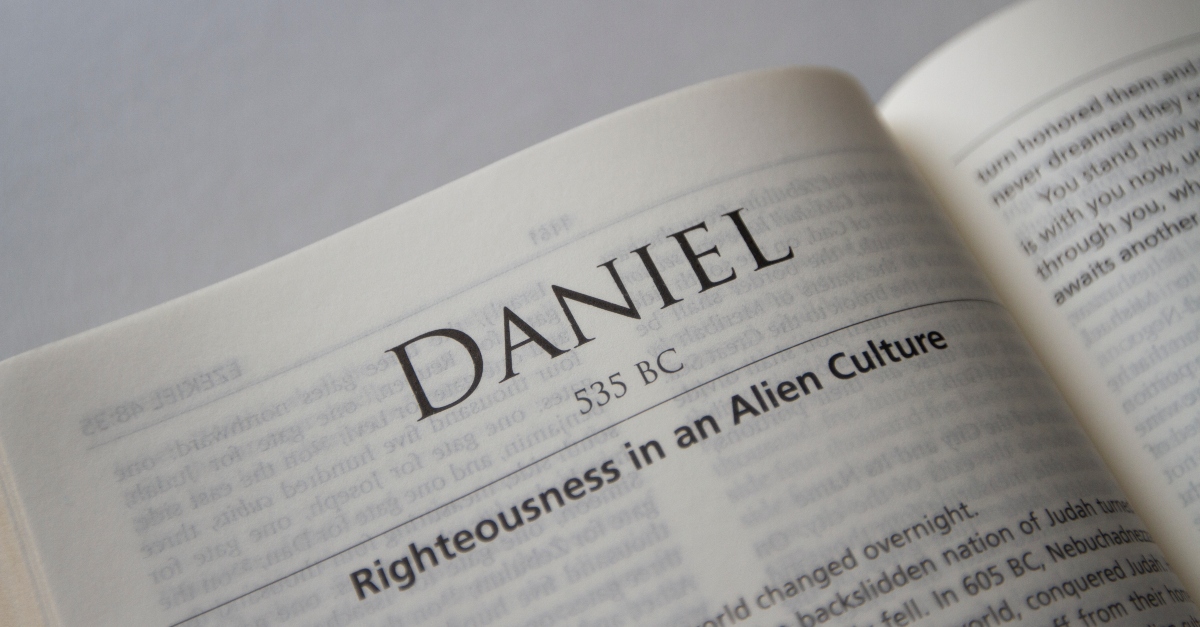
...‘Fallen! Fallen is Babylon the Great!’ She has become a dwelling for demons and a haunt for every impure spirit... – Revelation 18:2
With the current events of this world, evidence of the fall of Babylon in relation to end times is a topic of much conversation for Christians seeking clarity. In the Old Testament, the fall of Babylon is an actual event. In the New Testament, it takes on a symbolic form—as the time when Jesus will return and defeat the evil of our world.
The Bible clearly states, in Matthew 24:36-37, that no one knows when Christ will return. Learning about the fall of Babylon in relation to the end times can not give us a specific date to prepare for; however, it can help us strive to keep our relationship with God holy and on the right path for whenever Christ will return.
Photo Credit: ©GettyImages/Ronnie Chua
Where Is Babylon?

The country of Iraq is present-day Babylon. In the Bible, Babylon is first mentioned in Genesis 11. It was a city on the Euphrates River comprised of the descendants of Shem, one of Noah’s sons.
The city was becoming self-reliant, with one language seeking worldwide power by “making a name” for themselves. Their all-powerful self-reliance showed their lack of faith in God.
God saw the people of Babylon building this kingdom, represented by a tall tower. Then He confused their language and scattered the people over the earth.
Babylon then became a great city under the rule of King Nebuchadnezzar. It was home to one of the Seven Wonders of the Ancient World, the Hanging Gardens King Nebuchadnezzar made for his wife.
Babylon became a symbol of wealth, power, and prosperity in the region, worshipping idols and not the God of Israel.
What Is the Significance of Babylon in the Old Testament?
In the book of Exodus, God brought the Israelites out of slavery and into a land they would claim for their nation. God ensured that their enemies would be defeated, and the Israelites were protected by Him if they remained faithful.
The Israelites turned from God for hundreds of years. Different kings came to power and influenced the people to return to God and His laws, or cause the Jews to turn away from God by worshipping idols and being influenced by the evil nations surrounding them.
God became angry with the Jews and used prophets to proclaim to the people that they should repent of their sinful ways or God will send destruction to their cities. The people refused to listen, so God allowed Babylon to come into Jerusalem and destroy their homes and the temple of God built by King Solomon (2 Kings 25). The Jews were taken to live in Babylon for 70 years.
Photo Credit: ©Getty Images/RobertoDavid
The Fall of Babylon Prophesied in Old Testament Scripture

Even though God allowed Babylon to invade Jerusalem, He would not let their evil deeds go unpunished. Daniel was a prophet who was a part of the Babylonian exile and served King Nebuchadnezzar in his court. The king had dreams that his own magicians and mediums could not interpret. Daniel had a reputation of being able to understand dreams and visions, so he was ordered to go before the king to interpret his dreams.
In Daniel 2, he tells the King that other kingdoms will rise, greater than Babylon, and that the strongest kingdom (set up by God and never destroyed) will crush Babylon. Nebuchadnezzar was eventually dethroned for his arrogance and the fact that he exalted himself over God.
King Belshazzar was the successor who also defiled God by using items taken from the temple in Jerusalem for personal use. In Daniel 5, we read that writing appeared on the wall at the king’s palace. Daniel was immediately brought to the king to interpret the writing. Daniel reminded the king of what happened to Nebuchadnezzar in removing him from power. This king acted just as arrogantly and did not glorify God for the abundance given to Babylon.
Babylon’s destruction was again prophesied as the days of their nation would be numbered, the kingdom would be divided, and their ruler killed.
Isaiah prophesied about the fall of Babylon in Isaiah 47. Babylon’s brutality toward Israel would be met with their own destruction by Persia and King Cyrus.
The invasion and destruction of Babylon are also prophesied in the book of Jeremiah:
At the sound of Babylon’s conquest the earth will quake; a cry will be heard among the nations – Jeremiah 50:46 CSB
Finally, the prophecies are fulfilled in 539 BC as Persia conquers Babylon.
The Fall of Babylon in the New Testament
Some have compared Babylon in the New Testament to the rise of Rome and their control over the region. This has been disputed. In the New Testament, Babylon is a symbol of evil and an enemy of God, found throughout the world.
In the book of Revelation, John writes of his visions and prophecy regarding the fall of Babylon and the end times. Revelation 18 depicts the sins of Babylon and evil in our world. An angel comes down from heaven and calls out:
It has fallen, Babylon the Great has fallen! She has become a home for demons, a haunt for every unclean spirit, a haunt for every clean and despicable beast – Revelation 18:2CSB
Another voice commands the people to not be a part of her (Babylon’s) sins because they are piled up to heaven and God has remembered her crimes. She believes she will not be touched by grief, but she will be judged by God.
As Babylon is destroyed, those who have shared in her evil and morality will also grieve her destruction. After the fall of Babylon, a great celebration will take place in heaven. Everyone will worship God, rejoicing and thanking Him for His faithfulness. Satan will finally be defeated.
Photo Credit: ©SparrowStock
Babylon and the End Times

While many people disregard the prophecies of the Bible, those who have studied their fulfillment believe that the fall of Babylon will take place as it is written. Some people claim our world is approaching the end times; however, we have no way of knowing when that time will come. What we can do is prepare ourselves for Christ’s return whenever it may occur.
Babylon of the Old Testament and the New Testament shared a common downfall. Idol worship was their main sin. Babylon idolized itself and it did not acknowledge or glorify God in any way.
This is no different from today. We are constantly consumed with multiple idols that turn our focus away from God, His faithfulness, and plan for our lives. Idol worship leads to immorality when you are so consumed with the worship of other gods instead of the one true God.
We can become obsessed with worshipping money, careers, economic status, education, or politics. When you become focused on striving for success in these areas and not on God, you begin to rely on their role in your life rather than God’s provision.
5 Idols of Babylon That Will Cause Her Downfall
In Revelation 17-18, John shares the words of the angel and Babylon’s downfall. Babylon served their own gods, and other nations looked to Babylon as a god. Idol worship caused Babylon to turn from God in the Old Testament. In the New Testament as a symbol of evil, Babylon will also be destroyed because of five areas of idol worship.
1. The idol of self-sufficiency
Revelation 18:7 - Babylon believed they were the greatest superpower of the world. They had everything they needed. They did not rely on anyone or anything but worshipped their own greatness.
2. The idol of comfort
Revelation 18:14-17 - Babylon was clothed in luxury and wealth. They had no need for God and His provision. They amassed an abundance; never honoring God or caring for the needs of others.
3. The idol of obsession
Revelation 18:3 - Babylon had the worship of all the nations surrounding it. Everyone wanted what Babylon had and could not see the immorality and sin they were indulging in.
4. The idol of church persecution
Revelation 18:24 - Babylon of the Old Testament and New Testament persecuted the followers of God. Just as Jesus told Paul in Acts 9, when Christ’s followers are persecuted, Jesus is also persecuted.
5. The idol of deception
Revelation 18:23 - Babylon deceived those who worship them by allowing them to believe in their greatness when they were full of sin and immorality.
To determine how to prepare yourself for the end times, you can look at the Old Testament and the detriment of King Nebuchadnezzar and King Belshazzar. Daniel interpreted their dreams and told them what God was trying to say to the through them. We can also follow Daniel’s advice, by heeding these three ways to prepare for end times:
Photo Credit: ©Getty Images/webking
1. Prepare for End Times by Renouncing Your Sins
Daniel 4:27 – Nebuchadnezzar worshipped his own greatness. He ordered the people of Babylon to bow down and worship a golden statue he created. Daniel told the King to turn away from his sins and do what is right. The King was sent away for seven years and his kingdom was taken from him. He was humbled and praised God for turning him away from his sins.
In Acts 2, Peter tells the new believers to turn from their sin, to repent. Believing in God is not enough, you must turn away from the sins that keep you chained to another god.
2. Prepare for End Times by Honoring God
Daniel 5:23 – King Belshazzar worshipped his wealth. He used items stolen from the temple in Jerusalem for his personal parties and desecrated them. He praised his wealth of silver and bronze. Belshazzar never acknowledged or honored the one true God for all his prosperity. Daniel said he did not “honor the God who holds in his hand your life and all your ways.”
When we have an abundance, we do not always rely on God for His provision. We forget that through Him we have everything we need, and God’s hand is over our lives.
In Matthew 22:37, Jesus says the greatest commandment is to “Love the Lord your God with all your heart and with all your soul and with all your mind.” This is honoring God with your mind and your actions.
3. Prepare for End Times by Being Kind to the Oppressed
Daniel 4:27 – King Nebuchadnezzar ignored the needs of the Jews. The exiles were treated poorly after their city and temple had been destroyed. They were enslaved in a foreign land and persecuted. In Matthew 22:39, Jesus says the second commandment is to “love others as you love yourself.”
Nebuchadnezzar worshipped his greatness while blinded by the needs of those he enslaved. When your focus is inward and not on God or others, the needs of others are overlooked.
Conclusion
The fall of Babylon and the end times are key factors in the Old and New Testament. As Christians, we should not overlook their prominence, however we cannot be consumed by details of their fulfillment.
We do not know when Jesus will return and conquer the evil “Babylon” of our world. The only focus should be on living a life that consistently turns away from sin, honors God, and shows kindness to others. This will keep us from worshipping the idol of our own self-sufficiency and greatness.
Photo Credit: ©GettyImages/Rawpixel